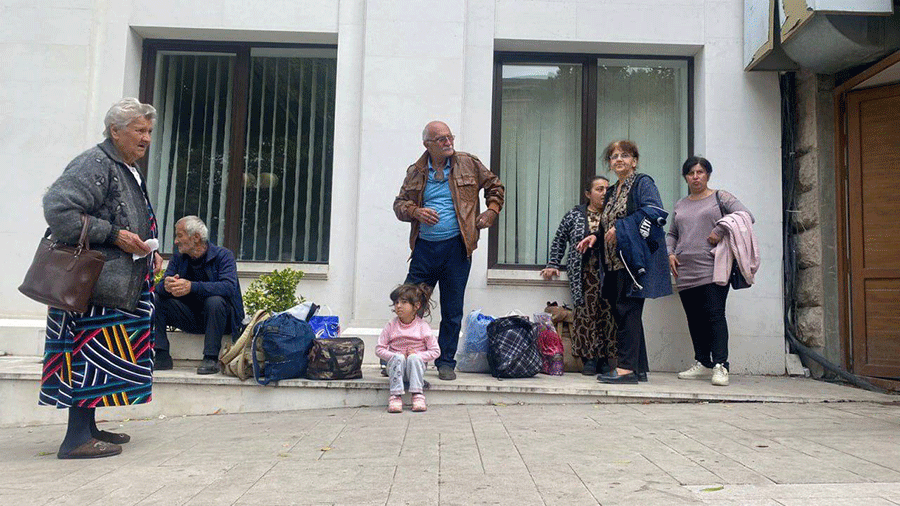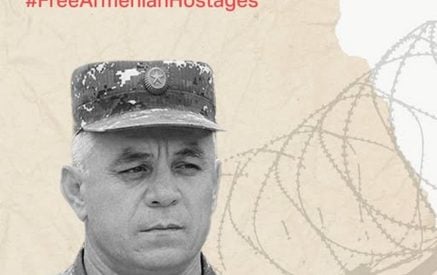On September 19, 2023, Azerbaijan launched a full-scale unprovoked military offensive on the Armenian civilian population of Nagorno-Karabakh. Since then:
-
At least 200 persons have been officially reported as dead, including 10 civilians, among whom 5 are children.
-
More than 400 persons have been officially reported as wounded, including more than 40, among whom 13 are children.
-
A school in Yeghtsahogh village has been bombed.
-
Azerbaijani forces shot at Russian Peacekeepers “Ural” vehicles transporting women and children evacuees, pursuant to reports CFTJ received from residents of Mets Shen village.
-
Azerbaijani armed forces have shelled and advanced into almost every civilian-populated village and town in Nagorno-Karabakh, including the capital Stepanakert, Martuni, Askeran, Martakert and Taghard.
-
Tens of thousands of civilians have unsuccessfully attempted to evacuate to neighbouring Armenia and access to the only humanitarian corridor has been blocked.
-
Amaras Monastery, the culturally significant 4th-century monastery that was home to the first school for the teaching of the Armenian Alphabet, where the grandson of the founder of the Armenian Apostolic Church is buried, has been occupied by the Azerbaijani forces.
-
Unverified information has been received of rapes, beheadings and executions of children and men.
Azerbaijan launched the offensive following a nine-month blockade of the Lachin corridor. The blockade has led to starvation of the 120,000 ethnic Armenians in Nagorno-Karabakh, causing legal experts to opine that Azerbaijan’s blockade of the Lachin constitutes genocidal intent. “The blockade of the Lachin Corridor by the Azerbaijani security forces impeding access to any food, medical supplies, and other essentials should be considered a Genocide under Article II, (c) of the Genocide Convention: ‘Deliberately inflicting on the group conditions of life calculated to bring about its physical destruction’” according to world renown legal expert Luis Moreno Ocampo (“Ocampo”). The Lachin corridor is the lifeline road connecting Nagorno-Karabakh with Armenia and, effectively, the outside world.
Azerbaijan’s current military offensive, which has been marked by bombings of civilian populations and cultural landmarks, started one day after the International Committee of the Red Cross (ICRC) was finally able to deliver 23 tons of aid after months of delivery attempts being blocked by Azerbaijani forces. Just as the starving Armenians finally got some reprieve from hunger, the bombs started falling. Since then, countless media posts and reports received by CFTJ have catalogued the terrified population taking shelter in basements to hide from the bombardement. The humanitarian crisis is rapidly unfolding as there is dire need for food, water, and medicine.
Although a Russian-mediated ceasefire was agreed on September 20, 2023, as in the 2020 war in Nagorno-Karabakh, the ceasefire was violated almost immediately and firings are ongoing. Azerbaijan demands that the Nagorno-Karabakh defence army be swiftly disarmed and the people of Nagorno-Karabakh to surrender.
Atrocities Occur in the Dark
There is a catastrophic risk that Nagorno-Karabakh will imminently become a black box with no communication or connection with the outside world. Azerbaijan is intermittently cutting internet connection, with the result being that atrocities are occuring in the dark. Azerbaijan forbids access to the region of any media, NGOs, civil society groups or UN special rapporteurs.
Due to the ongoing blockade and Azerbaijani military checkpoints installed along the Lachin corridor, Armenian civilians in Nagorno-Karabakh have no way to evacuate to Armenia. On September 20, 2023, thousands of civilians gathered to evacuate with their families at (the non-operational) Ivanian airport, now the Russian peacekeeping contingent headquarters. However, rather than being allowed to evacuate, they were ultimately turned away.
The Armenians of Nagorno-Karabakh have become prisoners and targets of ethnic cleansing on their ancestral land and no Armenian is safe. CFTJ is gravely concerned for the safety of our legal office staff and their families in Nagorno-Karabakh, who have themselves become victims. The only other international organisation currently based in Nagorno-Karabakh, Halo Trust, has also reported that communication with their colleagues is extremely difficult.
CFTJ calls on the UN, international NGOs, and human rights advocates and experts to urgently send fact-finding missions to Nagorno-Karabakh to investigate the humanitarian conditions and human rights protections for Armenians. Aliyev has already publicly professed to have “cleansed the region, the South Caucasus, of these savage [Armenian] forces” and there is grave danger that he is in the midst of seeing this aim out right now. The Armenian people of Nagorno-Karabakh must be protected.
























































